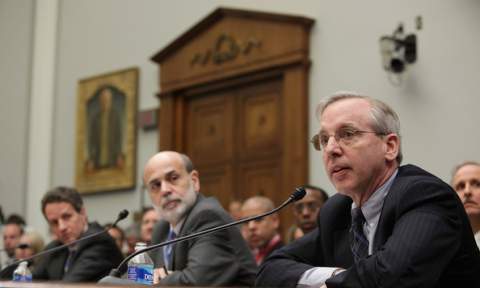On November 12, 2013, Richard (RJ) Eskow writes on NationOfChange.org:
It’s not easy to maintain a civil tone while describing the magnitude of the misbehavior among executives at Wall Street’s largest institutions. To criticize bankers is to describe large-scale wrongdoing, mass-produced outrages that lead to widespread misery. It can’t be done without routinely deploying words like “perjury,” “forgery,” “fraud,” “deceit,” “corruption” and “rapaciousness.”
Unfortunately, the forms of speech that adequately convey big-banker behavior also make it easy for insiders in politics, government and the media to dismiss that same speech as excessive.
That’s one reason why some recent remarks by William Dudley, president of the New York Federal Reserve Bank, are so important. He’s no outsider and he’s no extremist. And yet, after exploring potential solutions to the “too big to fail” problem in a speech to Global Economic Policy Forum last week, Dudley went on to discuss what he called “the apparent lack of respect for law, regulation and the public trust.”
Added Dudley: “There is evidence of deep-seated cultural and ethical failures at many large financial institutions.”
Mr. Dudley is using the language of courtesy and civility, but his language is blunt and even cutting. He’s speaking of individuals he knows well and with whom he interacts daily. That doesn’t prevent him from saying that bank executives have displayed disrespect for both law and regulation, that they are not worthy of the public’s trust, and that they are culturally and ethnically impaired at a profound level.
And yet, remarkably enough, House members from both parties are nevertheless supporting a Republican-backed initiative which would unwind some of the already-inadequate provisions of the Dodd-Frank financial reform law. There’s very little chance that President Obama will sign their bills, since he considers Dodd-Frank a signature achievement. But his administration retains its cozy relationship with major banks – a relationship that includes revolving-door appointees and a reluctant attitude toward the criminal prosecution of bankers.
That’s no surprise. How can legal safeguards be maintained when the money these institutions spend taints the political process from beginning to end? How can bank executives learn “respect for law, regulation and the public trust” when they are subject to the flattery of journalists, rather than the scrutiny of journalists? (See Roger Lowenstein’s puff piece about bank CEO Jamie Dimon in the New York Times Magazine for a classic example of that genre.)

But where is that shame, already? Big-bank executives have been insulated from it by sycophants in the media and politics.
Our society worships wealth and consumption, and that slavish devotion has reached massive proportions. Along with that worship, our society seems to have rejected the idea that there is any dignity in the life of ordinary, law-abiding working people. In a survey conducted last yearby a whistleblowers’ defense law firm, nearly half of the senior bankers polled acknowledged a willingness to break the law to make money. (Presumably there were a number of others who also would, but weren’t willing to admit it to a stranger.)
William Dudley, Ben Bernanke and the Federal Reserve banking system have yet to support the policies that will result in substantial double-digit GDP growth while simultaneously broadening, private sector individual ownership in FUTURE wealth-creating, income-generating productive capital assets.
What is needed is to implement the Capital Homestead Act. (http://foreconomicjustice.org/?p=8942)
Right now the Federal Reserve creates money by loaning it to banks, who re-loan it multiple times because of fractional banking rules. With Capital Homesteading, money would be created by loaning it directly to citizens via banks at near-zero interest to invest in FUTURE wealth-creating, income-generating (full dividend payout) productive capital assets formed by producer companies. To build real wealth and also phase out our near-defunct social security scheme, the new full-reserve money would go into a long-term retirement account to be invested in dividend-paying, asset-backed shares of corporations. That way, money power would be spread to all citizens. The middle class would be invigorated using the principle of compounding interest, instead of being decimated by mushrooming public and personal debt.
The Federal Reserve could play a more positive role, removing artificial barriers to equal citizen access to acquiring and owning productive capital wealth. By creating asset-backed money for production, supported by growth-oriented tax policies, the Federal Reserve could truly help promote shared prosperity in a market system.
Support the Agenda of The Just Third Way Movement at http://foreconomicjustice.org/?p=5797
Support Monetary Justice at http://capitalhomestead.org/page/monetary-justice
Support the Capital Homestead Act at http://www.cesj.org/homestead/index.htm and http://www.cesj.org/homestead/summary-cha.htm
See “Financing Economic Growth With ‘FUTURE SAVINGS’: Solutions To Protect America From Economic Decline” at NationOfChange.org http://www.nationofchange.org/financing-future-economic-growth-future-savings-solutions-protect-america-economic-decline-137450624, , “The Income Solution To Slow Private Sector Job Growth” at http://www.nationofchange.org/income-solution-slow-private-sector-job-growth-1378041490, and “A Solution To Eroding Retirement Security” at http://www.huffingtonpost.com/gary-reber/a-solution-to-eroding-retirement_b_4103834.html and at http://www.nationofchange.org/solution-eroding-retirement-security-1382020223.

